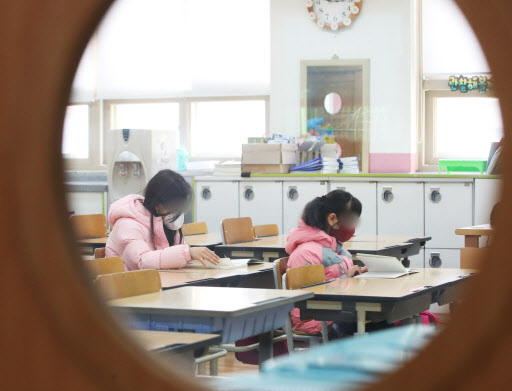The Korean government announced Tuesday that day care centers, kindergartens and elementary, middle and high schools in the country will remain closed until early April, amid an all-out fight against the spread of the novel coronavirus.
The start of the spring semester at kindergartens and schools nationwide will be pushed back from the current March 23 to April 6 on concerns that crowded classrooms might turn into new clusters of infections and further spread the virus in local communities. It was the third delay in school openings since the outbreak started.
“The ministry respects concerns raised by health authorities and experts that schools could be a major source of community spread of the virus,” Education Minister Yoo Eun-hae said at a briefing Tuesday, addressing the need to participate in nationwide “social distancing.”
The date of school openings could be “flexibly” adjusted -- brought forward or delayed further -- depending on how the situation develops here and around the world, she said.
The ministry did not announce whether there were any plans to delay this year’s college entrance exam, scheduled for Nov. 19, though it said it was reviewing “feasible” adjustments to the current university admission schedule in the wake of the five-week delay in school openings.
“We are reviewing various options and we will announce the decision on the university admissions schedule when schools open again,” Yoo said.
The move comes as the government grapples with clusters of infections across the country and a growing number of cases imported from abroad, although Korea has seen a slowdown in new cases this week. There were 8,320 cases and 81 deaths here as of Tuesday, according to the Korea Centers for Disease Control and Prevention.
Some 522 people under the age of 20 -- 86 people aged up to 9 and 436 aged 10-19 -- had tested positive for COVID-19 here as of Tuesday, according to the KCDC. None has died of the virus.
This year’s academic year was originally scheduled to begin March 2 before the date was pushed back three times. This will now mark the first time that Korean children return to school in April.
The ministry is to recommend the closure of private academies for two more weeks.
Before schools open again, the ministry plans to take preventative measures to ensure safety in classrooms in cooperation with regional education offices.
A total of 253 billion won in an extra budget will be spent on offering emergency care for children and students, buying masks and hand sanitizers and running online learning platforms, the ministry said.
Desks and chairs will be rearranged to widen the distance among students, the timetable for meals and rest periods will be readjusted, hand sanitizer will be provided and masks will be stockpiled.
Students, in the meantime, will take classes online under the guidance of teachers until school starts.
To ease the burden on educators, the legally required numbers of school days and classes will be slashed, the ministry said.
Under current local laws, the number of days that elementary, middle and high schools must be open is set at 190. In accordance with the ministry’s guidelines released in the wake of the coronavirus outbreak, up to 19 days could be eliminated at school principals’ discretion.
Parents appeared relieved about the decision to delay school openings, though the prolonged closure of schools could place a burden on working parents.
“My parents are looking after my child. I am worried to send her to the child care classrooms because she might get infected there. It would be difficult for her to keep a mask on all day or wash her hands frequently,” said a 39-year-old working mother who only gave her surname, Kang.
“I cannot afford to take a leave at work, forcing me to neglect my duty as a mother.”
The Education Ministry is running “child care classrooms” during the week at designated schools for parents who cannot afford to look after their children at home, but the service is not widely used.
Only about 2.2 percent of the parents of elementary school students have applied for the service, according to a survey carried out by the ministry.
Welcoming the decision, the Korean Federation of Teachers’ Associations, the country’s biggest teachers’ labor group, called for thorough follow-up measures to get the schools ready for the new school year.
By Ock Hyun-ju (
laeticia.ock@heraldcorp.com)








![[Today’s K-pop] Blackpink’s Jennie, Lisa invited to Coachella as solo acts](http://res.heraldm.com/phpwas/restmb_idxmake.php?idx=644&simg=/content/image/2024/11/21/20241121050099_0.jpg)